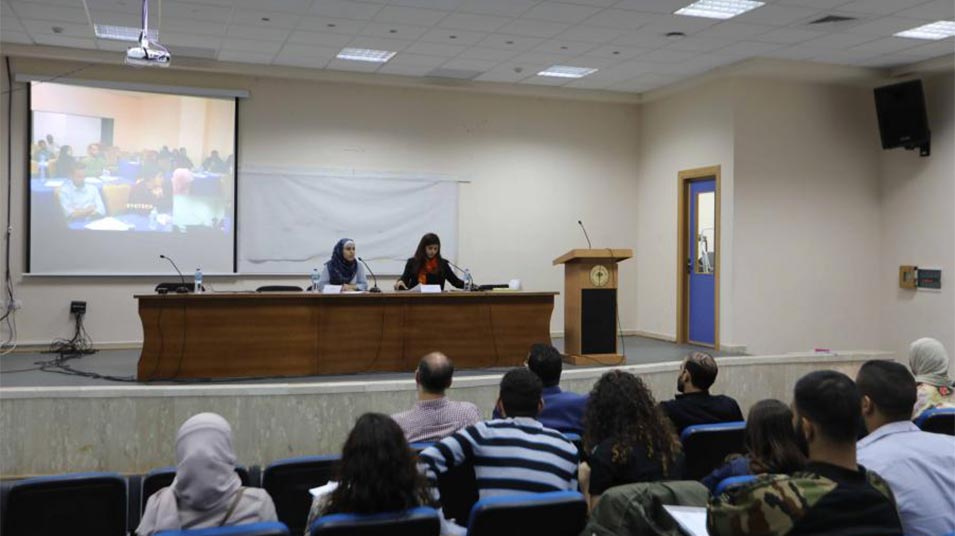Students, researchers, activists delve into the intricacies of the Palestinian identity
Students, professors, and social activists explored concepts and notions behind the Palestinian national identity and methods to reinforce it within the Palestinian society in a symposium held on Birzeit University’s campus on Saturday, April 21, 2018.
The symposium, entitled “In the Palestinian Identity,” was organized by the Center for Development Studies at Birzeit University and featured Nahed Samarah, executive director of the center, who spoke on behalf of Vice President for Community Affairs Dr. Asem Khalil.
“In the Palestinian Identity” gathered Palestinian youth from all of historic Palestine to reinforce discussions and build a common understanding among them despite the particularities imposed by the colonial power.
In his speech, Khalil highlighted the university’s ongoing commitment to creating a deeper understanding of Palestinian fragmentation and the impact of the colonial settlement movement and its associated policies.
“Such policies aim to reestablish the colonial structure in such a fashion that fits Israeli schemes to fragment Palestinian areas and segregate them, both symbolically and factually,” said Samara, quoting Khalil.
“Our goal here is to encourage discourse on the various issues and problems on which the center is working – together with the youth and led by them – on the epistemic level; align it with the reality in historic Palestine; critically review the overall Palestinian issues and their historical and present realities; deeply analyze the issues that currently beset life in Palestine; and understand the present so that we could change it,” wrote Khalil in his speech.
Marah Khalife, Together for Change coordinator, introduced audience members and attendees to the group, calling it a “youth-led, independent Palestinian group that aims to bolster Palestinian national identity within the Palestinian youth.”
The group, Khalife added, is working toward raising Palestinian awareness that can challenge the fragmentation and segregation put in place by the Israeli Occupation.
“Our point of entry is the collective Palestinian memory, which we engage by drawing from the history and emotions of Palestinian refugee camps – the ultimate result of the Zionist colonial movement,” Khalife further explained.
The first session of the symposium, entitled “The Palestinian Identity and the Colonial Context,” was chaired by Fatima Harb, a social activist with Together for Change, and featured Rami Salameh, a lecturer in the Department of Philosophy and Cultural Studies, whose speech was entitled “Thinking in a Palestinian Context,” and Lena Meari, acting director of the Institute of Women’s Studies, who discussed “The Settler Colonial Context in Palestine.”
The second session, entitled “The Question of Action,” was chaired by Nouran Abbasi, a Together for Change volunteer, and featured Salma Rashdan, a social activist, who explored activism among Palestinians in the diaspora in her speech, “How Can Diaspora Action Reach Palestine?”; Muthana Khamees, of “Nabd” Youth Group, who detailed the group’s experiences; Muhannad Abdel Bari, an activist with the Sharik Sha’bak Campaign [Share With Your People], who reviewed the campaign’s aims and objectives during the last Israeli assault on Gaza; and Khalil Gharra, from the Prawer Campaign, a youth movement against the Begin-Prawer colonial settlement plan.
The third session, “Fragmentation: Dialectic of the Political and the Cultural,” was moderated by Shurouq Al-Hajjar, and featured Imad Abu Rahmeh, an expert on Palestinian identity, who shed light on the Oslo Accords in his speech, “Oslo: a Discourse between the Political and the Cultural,” and Mo’iz Karaji, a media professor at Birzeit University, who gave final remarks and conclusions that pieced together the varying themes and subtopics of the symposium.
The final session was followed by an hour of open-ended discussions, during which attendees and panelists debated on the topics of the symposium.








